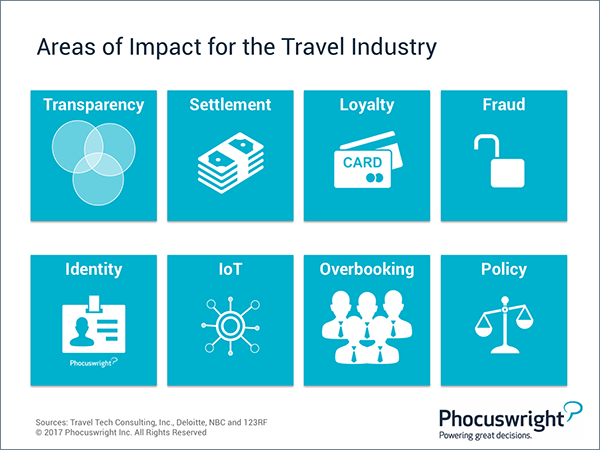Blockchain: A revolutionary and evolutionary change in the travel infrastructure
- Published:
- December 2017
- Analyst:
- Norm Rose

- Blockchain is the most revolutionary technology within our lifetime and will usher in a new "Internet of Value."
- Blockchain has become the most overhyped technology in the public sphere, with little ability to impact the travel industry for many years.
As is the case with many types of emerging technologies, the true value of blockchain will likely fall between these two hyperbolic statements.
Blockchain is the underlying technology infrastructure introduced with the launch of Bitcoin in 2009. At its heart, a blockchain is a highly encrypted, distributed peer-to-peer network that stores information like a database. But unlike a database where there is one centralized copy of the records, in a blockchain, each node of the network retains a full copy of the ledger.
A public/permissionless blockchain utilizes "miners" who verify every change by solving a cryptographic mathematical problem. This process prevents the data from being altered by a single party, ensuring that the data maintains integrity, and making it virtually impossible to hack. The primary impact is the creation of trusted environments where two parties can do business without the need for a middleman to verify transactions.
Private blockchains, closed to public access, also exist. While they can reduce infrastructure and labor costs, they will continue to rely on third parties and maintain the role of the middleman. A true permissionless, open blockchain reduces the barriers for innovation by launching a platform that can be tapped into by software developers worldwide, similar to an open-source model.

(Click image to view a larger version.)
In either case, blockchain technology is poised to impact processes and roles across the travel ecosystem:
- Transparency: Blockchain entries are immutable. Blockchain can provide a permanent record of the flow of money through the travel life cycle, bringing more transparency to the process.
- Settlement: Blockchain can impact the complex settlement process by automatically executing Smart Contracts and settling with both the buyer and seller within hours versus days.
- Loyalty: Blockchain may uncover new ways to utilize loyalty points seamlessly across vendors.
- Fraud: The blockchain distributed ledger helps to dramatically reduce fraud, because a change to a single node will be identified quickly if it differs with rest of the ledgers on the blockchain.
- Identity: The blockchain platform could be used to store a traveler's identity and enable it to be used across transactions.
- IoT (Internet of Things): Blockchain could be used to keep track of any asset, for example, a passenger's luggage or airline equipment at an airport.
- Overbooking: Blockchain's ability to prevent double spending could in theory remove the problem of double bookings in the industry.
- Policy: Blockchain could help the corporate travel industry improve its ability to track negotiated fares/rates, as they can be auto-executed by Smart Contracts.
RELATED RESEARCH
Will Blockchain Disrupt Travel Distribution and Settlement?
Blockchain Update: How and Why Blockchain Can Transform the Travel Industry
The Ultimate Tech Talk at Phocuswright Europe
See and understand the next level of technological innovation – including blockchain, artificial intelligence, chats and bots – at the Phocuswright Europe (May 15 - 17 in Amsterdam) session, The Ultimate Tech Talk.
Register through January 19 to save €600 off the final ticket price.












